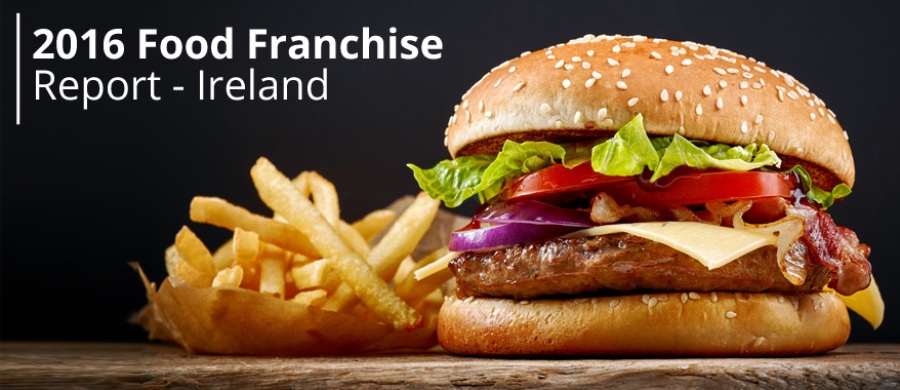
Of all of the various industries and economic sectors that have adopted the franchising model, it is easily most popular among food companies of various types, whether upmarket restaurant chains or fast-casual and quick-service restaurants (QSRs). The latter were among the first companies to adopt the franchising business model, and remain industry leaders: of the top ten franchises in Europe, all but one are in the food industry. The food industry has demonstrated over the years to be a resilient and reliable one, and which constantly adapts equally well to changing industry trends and societal mores. Below, we shall discuss the state of the industry in Ireland, and what’s in store for the coming year.
Irish Food Service Industry
Ireland’s food service industry is in good health as of the end of 2016. Bord Bia estimate that the industry is now worth €7.5 billion, and forecast that it will worth €9 billion by the year 2020. This represents a massive 16% increase over the industry’s value at the end of 2015. This increase is also an optimistic sign that the food service industry is recovering after the recession: 2008-12 saw the industry’s turnover steadily declining to a low of €5.3 billion, so this increase is a marked improvement over those trying years. Within the industry, quick-serve restaurants accounted for more than a third of last year’s revenue. The success is not limited solely to establishments whose primary offering is food: as many pubs have seen diminishing returns from alcohol sales alone in recent years, the gastropub sector is showing impressive signs of growth, with 18% of the food industry’s revenue coming from food sold in pubs. Bord Bia likewise reported that the area exhibiting the biggest signs of growth was the coffee shop sector, although this was from a comparatively smaller base than many other sectors.
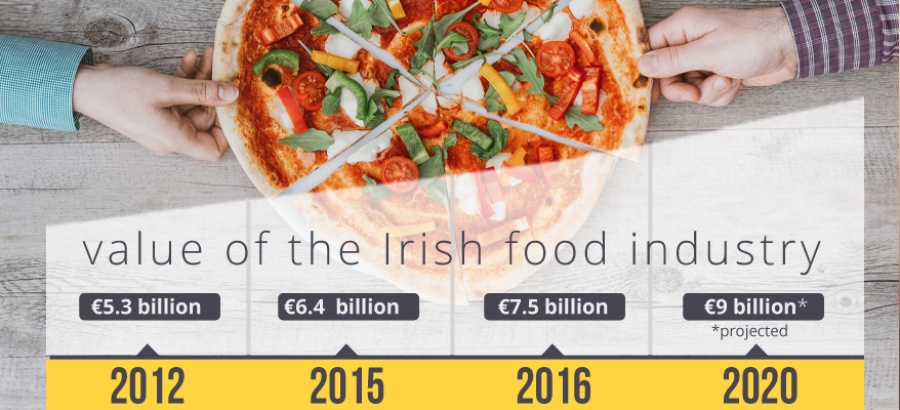
Irish Food Franchises
As for food franchises in Ireland, eight such companies are registered members of the Irish Franchise Association, while eight food franchises are currently advertising with us on FranchiseDirect.ie, including The Galway Roast and Jon Smith Subs. In April of last year, the Irish Franchise Association held their annual awards ceremony, in which many of the winners and finalists were in the food service industry. These awards included Supermac’s for Franchise of the Year (Retail); Franchisor of the Year for AIL Group; Best Indigenous Irish Franchise for Insomnia Coffee Company; Outstanding Growth Award for Eddie Rockets; and Best Emerging Franchise for Freshly Chopped.
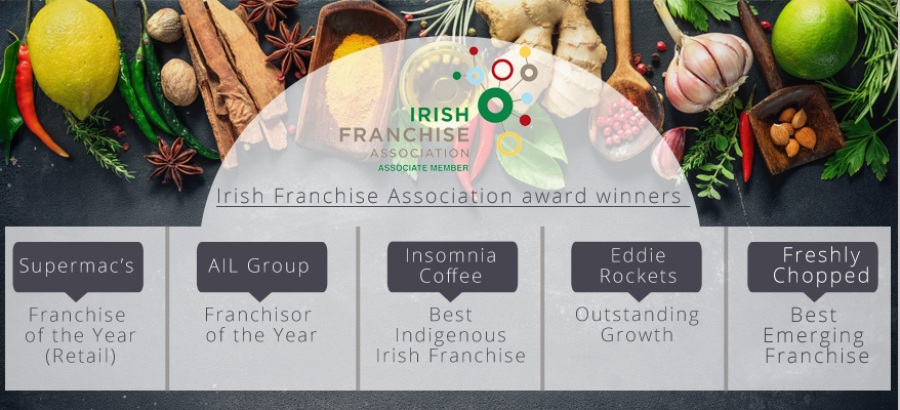
All of these companies had very successful years in 2016. Supermac’s, the popular fast-food burger chain, reported after-tax profits of €14 million (double the previous year’s profits), while the company’s revenue increased by 24% to €116 million. AIL Group, the company which owns Abrakebabra, Bagel Factory and O’Brien’s Sandwich Cafe (among other franchises), recently opened their 130th branch in Kildare, and announced plans to create 300 Irish jobs over the next three years. Insomnia Coffee Company reported profits of €1.9 million last year, a figure which is only set to increase as the company continues their expansion into the UK. Eddie Rocket’s have recently had much success expanding into the upmarket quick-service restaurant space, under the “Rocket by Eddie Rocket’s” brand. Freshly Chopped has cornered the market on healthy quick-service franchise restaurants, opening numerous locations across Dublin and partnering with petrol stations.
Other than these companies, Ireland was a very successful market for foreign food service franchises as well: the popular Five Guys burger chain opened its first Irish branch in Dundrum, while McDonald’s Irish branches outperformed other regions in which they operate last year, with revenues increasing by 5% to €84.9 million. So what can we anticipate for the Irish food service industry over the course of this year? Below, we shall discuss some of the most prominent trends and events facing the industry in 2017.
Industry Trends
Brexit
As of February 2017, by this stage any informed reader has likely tired of hearing about the potential impact of Brexit upon a given economic sector, but it remains the case that the UK’s unexpected vote to leave the EU in June of last year has massive and far-reaching implications across any number of industries worldwide. Ireland’s food service industry is no exception. Article 50 has yet to be triggered, and already the downturn in the value of the pound sterling immediately after the referendum saw consequent decreased spending by British tourists in Ireland during the holiday months of July and August. British tourists’ spending may have decreased by anywhere from 12 to 20% compared to the same period in the previous year. The pound’s value has significantly recovered in the months since August, which should hopefully correct this trend; but it remains to be seen what impact the UK leaving the EU will have on the Irish tourist industry, and by extension on the food service industry. Thousands of jobs could potentially be threatened, both in the food service industry and in the food production industries. On the other hand, however, Bord Bia reported that tourism in Ireland on the whole increased in 2016, which may be an optimistic indication for how 2017 will turn out for the food service industry. Bord Bia food service specialist Maureen Gahan said: “It has been a bumper year for foodservice in Ireland. Despite the uncertainty that Brexit brings, we are still in the enviable position of being the fastest growing economy within the EU.”
Healthy Eating
One of the most interesting trends of the food service industry in the 2010s is the increased prominence of healthy options, not just in specialist health food shops, but also to an unprecedented degree in quick-service restaurants and “food-to-go” establishments (or takeaways). In Ireland, as in many other western nations, the modern food consumer is nutritionally conscious and literate, and puts a great deal of thought into the nutritional content of the food they buy and how it will impact upon their health. On this very website we have previously reported on the emergence of Irish quick-service franchises which specialise in healthy food (such as the aforementioned Freshly Chopped); but even multinational fast-food franchises such as McDonald’s, Domino’s Pizza and Pizza Hut have recently taken steps to diversify their menus, decrease the salt or sugar content of their products, and other measures to promote healthier eating. Several commentators have attributed to this development to the possible mandatory inclusion of nutritional content information on food in the near future, along with upcoming “sugar tax” legislation which would penalise the providers of overly sugary food. If legislation such as this does come to pass in Ireland, we can only expect Ireland’s food service industry to become more health-conscious than ever before.
Environmental Friendliness and Local Sourcing
Hand in hand with the increased focus on healthy eating among Irish consumers is a growing concern about the environmental impact their buying choices have. Environmental concerns are visible in just about every Irish industry, and the food service industry is no exception to this rule. Major food franchises such as Subway and Costa Coffee have made major efforts to decrease their environmental footprint, such as by switching to recyclable packaging or environmentally-friendly ingredients, oil and cleaning supplies. A major way Irish consumers are contributing to the environment is by showing an increased preference for locally-sourced foods, both due to their health value and due to the reduced carbon emissions associated with transporting them. According to this Bord Bia study, two-thirds of Irish consumers believe it is important to purchase local food, two-thirds of consumers perceive local food to be of high quality and nearly four out of every five people believe they are supporting their local community by purchasing locally sourced food. Taking account of this, many large franchises such as McDonald’s and Burger King have already begun to advertise that their beef is sourced from Irish farms. Environmental awareness and locally sourced food look certain to be two trends which are here to stay as far as the Irish food service market goes, so food service franchises would do well to take account of these in planning their businesses and advertising.
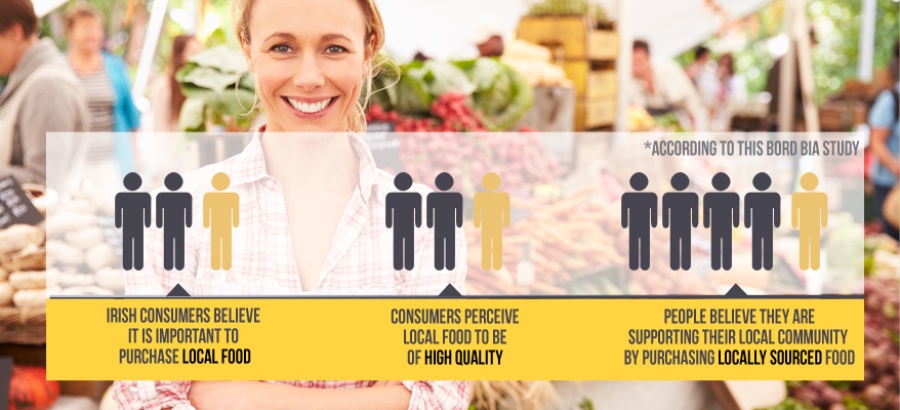
Outlook
In this competitive market, it’s important for franchises to be open to change, to evolve and keep up with the trends. Irish consumers are focusing heavily on the nutritional value of their food, where it comes from and how it is prepared, so it is important for those in the food business to be conscious of these issues as well if they want to succeed. Irish consumers want convenience, but not at the expense of quality. Franchises will have to find innovative ways to combine convenience, low price and healthy, quality food to attract their customers.
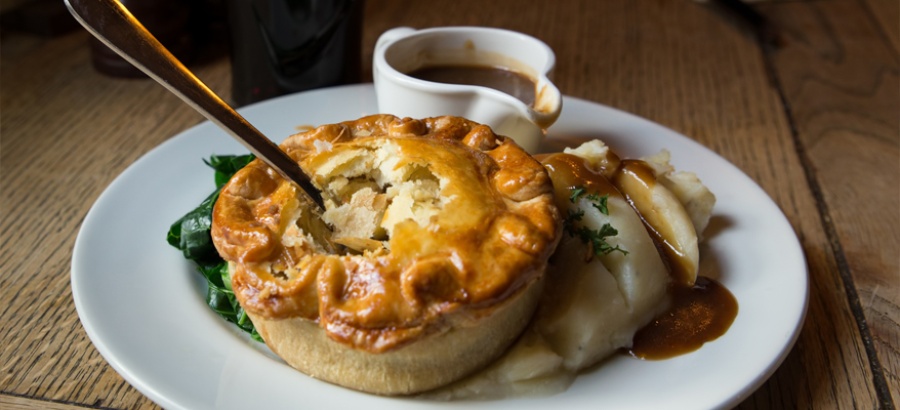
For more information on food franchises, see our food franchise opportunities page.














